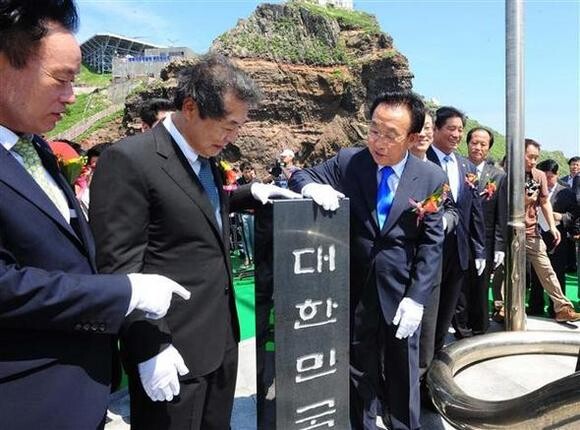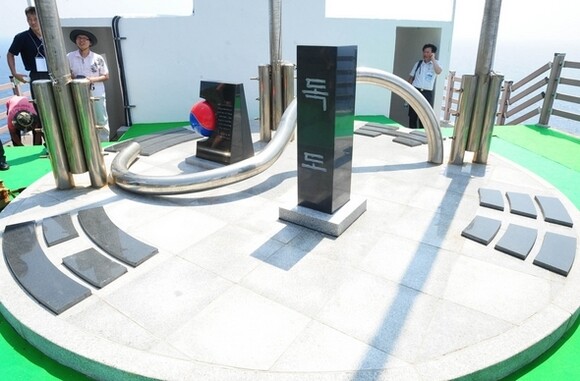hankyoreh
Links to other country sites 다른 나라 사이트 링크
Territorial disputes prevent cooperation in East Asia

By Park Min-hee, Beijing correspondent and Jeong Nam-ku, Tokyo correspondent
The countries of East Asia should be enjoying a cordial atmosphere these days. With South Korea celebrating the twentieth anniversary of diplomatic relations with China on Aug. 24 and the fortieth anniversary of relations with Japan on Sept. 28, many were expecting the region to be celebrating the end of the Cold War and stepping up cooperative efforts.

The reality is the exact opposite. The East Asia of today is a morass of territorial disputes and nationalism.
At 7:30 am on August 19, ten Japanese far-right activists landed on Uotsuri, the main island of the Senkaku (Diaoyu) Islands, waving the Japanese flag. Among them, according to the NHK network, were a handful of members from the Tokyo Metropolitan Assembly and other municipal governments.
The Japanese government had refused permission for the landing, but the individuals were able to reach the islands by mixing in with a group of 150 people traveling in the area, and then swimming the rest of the way. Included among the group were eight members of an association of Japanese Diet politicians, headed by Liberal Democratic Party (LDP) lawmaker Eriko Yamatani, that has the stated goal of “protecting Japan’s national territory” and previously announced plans to stage a memorial ceremony on the island.
“The illegal acts of Japanese right-wing forces were a violation of China’s territorial sovereignty,” said Chinese foreign ministry spokesman Qin Gang.
Qin added that the responsible official at the foreign ministry had already held a stern exchange with the Japanese ambassador, in which Beijing voiced strenuous complaints and demanded that Tokyo cease actions that “compromised China’s territorial sovereignty.”
The Senkaku Islands are effectively controlled by Japan, but are the subject of a continued territorial dispute with China and Taiwan. At present, no one is allowed to travel there without permission. But in the space of the past week, the flags of China, Taiwan, and Japan have each been flown there -- symbolic of the intense sentiments gripping East Asia at the moment.
First, a group of activists from Hong Kong and mainland China landed there on Aug. 15 to mark the 67th anniversary of the end of World War II. They were arrested by Japan, which deported all fourteen two days later. Meanwhile, anti-Japan sentiment has grown sharply in China, with a number of demonstrations in cities such as Hangzhou and Shenzen. The activists said they plan to attempt to land on the island again in October. Anti-Japan activity has increased on the Chinese internet, with the sentiment fueled by both historical issues and China’s growing power in the region.
This escalation in tensions was sparked by President Lee Myung-bak. On Aug. 10, five days before South Korea’s Independence Day holiday and one day before an Olympic football match against Japan, Lee became the first South Korean president to visit Dokdo. A few days later, he demanded an apology from Japanese Emperor Akihito. Amid seething sentiment in Japan, members of the country’s Cabinet made an Aug. 15 visit to pay their respects at Yasukuni Shrine, a controversial symbol of its pre-WWII imperialism.
Tokyo responded by firing back against Seoul. Prime Minister Yoshihiko Noda said on Aug. 17 that his government would respond with “steadfast resolve.” He currently plans to hold a Cabinet meeting on August 21 to discuss a response on the Dokdo issue.
Members of the country‘s far right have criticized the Noda Cabinet for its “feeble” response and demanded sterner measures. Now Tokyo appears to be actively considering canceling a currency swap agreement with Seoul - an idea initially proposed by the country’s right-wing media.
LDP president Sadakazu Tanigaki was among the voices demanding more aggressive action. “The reason this territorial issue continues unresolved is because of the limpness of the government’s response,” he said.
Within China, critics are saying Japanese right-wingers have already engaged in antagonistic behavior this year, including a move to purchase the islands.
“China-Japan relations are in a serious state, yet right-wing Japanese politicians are creating problems on the Diaoyu issue while thinking only of their short-term domestic interests,” said Wang Dong, a professor at Peking University and head of its Center for Northeast Asian Strategic Studies.
“Japan’s recent provocations with the Diaoyu Islands break a tacit accord between Beijing and Tokyo, and represent an attempt to pressure China by drawing the US into things,” Wang said.
Less noticed amid the flare-ups is the prickly state of Seoul’s relations with Beijing, which celebrate their twentieth anniversary this year. Chinese figures attending a recent commemorative event did not attempt to conceal their displeasure with the attempts by some South Koreans to politicize activist Kim Young-hwan’s recent claims of being tortured while under detention in China.
“As they face the end of their term, the President and administration are being too aggressive in their attitude of ‘talking straight to Beijing,’” said Sungkyunkwan University professor Lee Hee-ok.
“We’ve let ourselves get shackled to domestic issues, and now our relations with Beijing, Tokyo, and Pyongyang are on the outs,” Lee added.
Please direct questions or comments to [english@hani.co.kr]
Editorial・opinion
![[Column] Has Korea, too, crossed the Rubicon on China? [Column] Has Korea, too, crossed the Rubicon on China?](https://flexible.img.hani.co.kr/flexible/normal/500/300/imgdb/original/2024/0419/9317135153409185.jpg) [Column] Has Korea, too, crossed the Rubicon on China?
[Column] Has Korea, too, crossed the Rubicon on China?![[Correspondent’s column] In Japan’s alliance with US, echoes of its past alliances with UK [Correspondent’s column] In Japan’s alliance with US, echoes of its past alliances with UK](https://flexible.img.hani.co.kr/flexible/normal/500/300/imgdb/original/2024/0419/2317135166563519.jpg) [Correspondent’s column] In Japan’s alliance with US, echoes of its past alliances with UK
[Correspondent’s column] In Japan’s alliance with US, echoes of its past alliances with UK- [Editorial] Does Yoon think the Korean public is wrong?
- [Editorial] As it bolsters its alliance with US, Japan must be accountable for past
- [Guest essay] Amending the Constitution is Yoon’s key to leaving office in public’s good graces
- [Editorial] 10 years on, lessons of Sewol tragedy must never be forgotten
- [Column] A death blow to Korea’s prosecutor politics
- [Correspondent’s column] The US and the end of Japanese pacifism
- [Guest essay] How Korea turned its trainee doctors into monsters
- [Guest essay] As someone who helped forge Seoul-Moscow ties, their status today troubles me
Most viewed articles
- 1[Column] The clock is ticking for Korea’s first lady
- 2Samsung barricades office as unionized workers strike for better conditions
- 3[Correspondent’s column] In Japan’s alliance with US, echoes of its past alliances with UK
- 4After 2 months of delayed, denied medical care, Koreans worry worst may be yet to come
- 5[Column] Has Korea, too, crossed the Rubicon on China?
- 6Hong Se-hwa, voice for tolerance whose memoir of exile touched a chord, dies at 76
- 7US overtakes China as Korea’s top export market, prompting trade sanction jitters
- 8All eyes on Xiaomi after it pulls off EV that Apple couldn’t
- 9[Photo] Smile ambassador, you’re on camera
- 10[News analysis] After elections, prosecutorial reform will likely make legislative agenda